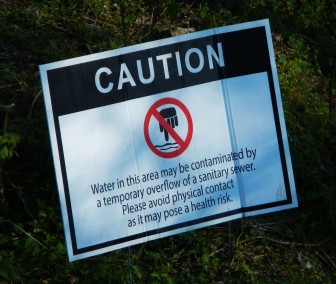Conservation Groups Push For Faster Alerts on Sewage Spills
As the Black Warrior Riverkeeper, Nelson Brooke keeps a record of all known sewage spills in his watershed. “See all these SSO notifications? That’s just this week,” he says, as he goes through his email.
SSO’s are Sewage Spill Overflows from public or private sewer operators. In 2016, Alabama conservation groups found that the state had more than 1,200 reported SSO’s that year. One spill can release up to hundreds of thousands of gallons of raw sewage. According to Brooke, people out swimming or fishing in state waterways might not know when that water is contaminated.
Current law says sewer operators must report any leak to state regulators within 24 hours. If the spill could endanger human health, they also must notify the public. Brooke says this language is problematic. “It’s worded in a fairly vague way, that’s not effectively enforceable,” he says. Brooke argues that people recreating in the water are not notified on time, if at all. “So basically what we have is some operators notifying ADEM within 24 hours, a lot of them still not even accomplishing that, not being held accountable for that by ADEM, not being fined.”
A spokeswoman for ADEM, the Alabama Department of Environmental Management, declined an interview, but said in an email the agency addresses noncompliance, though consequences range from a warning phone call to litigation.
A Petition for Change
Last year, nine water conservation groups petitioned the agency that oversees ADEM to change the requirements for public notification. Specifically they sought to require operators notify ADEM of a spill within 12 hours rather than 24, offer opt-in email and phone alerts for the public, and require signs be posted about the contamination. The petition was denied. ADEM described the requests as “logistically burdensome and resource intensive.” However, the agency did start an opt-in email notification system for residents last year.
For residents like Ayanna Anderson, email alerts about water contamination may not be of all that much use. “No I’m old fashioned. I don’t fool with email, Gmail, none of the above,” Anderson says. On a recent afternoon, she and her family spent the day fishing along Valley Creek in Bessemer. Their fishing hole is downstream of a frequent overspill site, and Anderson says she wants physical notification when there could be sewage contamination, explaining, “A big ole’ sign right here when I get out my car. Warning! Danger!”
Reaching the Public
The director of environmental services for Jefferson County, David Denard, says it can be a complicated task to post signs at local recreation sites when there is potential contamination. “It’s a challenge when you have a 3,500 mile system,” Denard says. “Our staff can’t always know every neighborhood and it’s really a challenge in knowing where to get those notifications and put those signs out.”
When a significant spill threatens local waterways, Denard stresses that the county notifies ADEM and local media. Yet, he also says some overflows have no impact on the public, like when a cracked pipe releases barely any sewage. In these cases, Denard says too much notification can backfire. “You’re going to overwhelm the public with information,” he says,”and when you really need to get the notification out, you want (to) get the attention you need.”
According to Denard, Jefferson County has reduced the number of sewage spills by more than half in recent years. Though, when there is a spill, conservation groups stress that people need to know about it before potentially recreating in contaminated water.
Pentagon puts Scouts ‘on notice’ over DEI and girl-centered policies
After threatening to sever ties with the organization formerly known as the Boy Scouts, Defense Secretary Hegseth announced a 6-month reprieve
President Trump bans Anthropic from use in government systems
Trump called the AI lab a "RADICAL LEFT, WOKE COMPANY" in a social media post. The Pentagon also ordered all military contractors to stop doing business with Anthropic.
HUD proposes time limits and work requirements for rental aid
The rule would allow housing agencies and landlords to impose such requirements "to encourage self-sufficiency." Critics say most who can work already do, but their wages are low.
Paramount and Warner Bros’ deal is about merging studios, and a whole lot more
The nearly $111 billion marriage would unite Paramount and Warner film studios, streamers and television properties — including CNN — under the control of the wealthy Ellison family.
A new film follows Paul McCartney’s 2nd act after The Beatles’ breakup
While previous documentaries captured the frenzy of Beatlemania, Man on the Run focuses on McCartney in the years between the band's breakup and John Lennon's death.
An aspiring dancer. A wealthy benefactor. And ‘Dreams’ turned to nightmare
A new psychological drama from Mexican filmmaker Michel Franco centers on the torrid affair between a wealthy San Francisco philanthropist and an undocumented immigrant who aspires to be a dancer.







